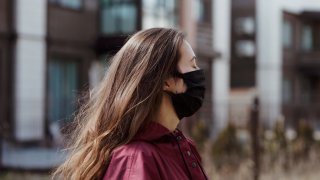
After an unprecedented year, it seems impossible to look ahead at what's to come in 2021. But with vaccines for Covid-19 rolling out across the country, increased testing and advancements in therapeutic treatments, experts are starting to have a clearer idea of what the future holds.
Dr. Anthony Fauci, the nation's leading infectious disease expert, has said that by the end of 2021, the United States could "approach some level of normality."
As soon as the fall, "things like being able to go to theaters, clearly feeling much more comfortable about school, having restaurants open to indoor dining," could be possible, Fauci told CNBC's Meg Tirrell during a special edition of the "Healthy Returns" conference Dec. 16.
Of course, any scenario is dependent upon enough people getting vaccinated and continuing public health measures such as wearing masks and social distancing. Between 75 and 80-85% of the population needs to get vaccinated in order to achieve herd immunity, Fauci said.
So what will life look like in 2021? Here's when you might be able to do various activities in a post-pandemic world, based on what we know now:
Everyone gets vaccinated
When to expect it: Second quarter of 2021
Money Report
Fauci and other experts predict that by the second quarter of 2021, the "overwhelming majority of the population" will be able to get vaccinated, he told CNBC's "Healthy Returns" conference Dec. 16. In March and early April, for example, people without underlying health conditions could walk into a drugstore and get the vaccine.
Testing vaccines for young children will likely begin around the second quarter, and kids could be vaccinated by the end of 2021, Dr. Jose Romero, the chair of the CDC's Advisory Committee for Immunization Practices, said during an interview on MSNBC Dec. 4.
But it will still take more data and time to determine whether the current vaccines can effectively prevent transmission, Brittany Kmush, assistant professor of public health at Syracuse University who specializes in infectious disease epidemiology, tells CNBC Make It. "We know they're very effective at preventing disease, and definitely death, but what we don't know is how good they are at preventing infection," she says.
Given that, "hopefully by the second part of 2021, we can start seeing a significant decline [in infections], and hopefully a control of this disease," Antonio Crespo infectious diseases physician and medical director at Orlando Health, tells CNBC Make It.
Having a large outdoor gathering without masks
When to expect it: Summer of 2021
We know that congregating outdoors where there's better air flow and more room to maintain social distance is safer than doing it indoors. Dr. Ashish Jha, dean of Brown University's School of Public Health, said July 4th outdoor gatherings next year are doable, during an episode of the podcast "In the Bubble with Andy Slavitt" that aired Nov. 30.
"I expect in July, to be able to have a barbecue outside of my house and have 15-20 people over not be freaking out," Jha said. "Try to get people to make a little distance maybe a little. Masks, we can talk about that. If they come into inside the house, definitely mask but maybe outside."
In communities where vaccine acceptance is high above 80%, "that'll make a massive difference," he said.
Returning to the office
When to expect it: Second half of 2021
If workplaces decide that employees will return to physical offices versus work from home permanently, the timing of that transition should depend upon the amount of virus spread and the level of protection (vaccination) in a community.
Fauci has said that once there is "an umbrella of herd immunity," then the threat of outbreaks in businesses "is going to be extremely low," regardless of the industry, Fauci told the Wall Street Journal on Dec. 8. The U.S. could reach herd immunity by the end of next summer or fall. At that point, people could return to an office building, but may still need to wear masks and maintain social distance.
Surveillance testing, in which a certain percentage of a specific population is monitored to track increasing or decreasing prevalence, could be crucial for employers to assess the risks and make decisions about returning to the workplace.
"We'd have to wait for for a significant decline on the number of cases that stays down," before it's safe to return to workplaces in-person, Crespo says. "What we've seen, which is what we have expected, is that the rates go down and then after a few weeks they start going up again."
Traveling safely
When to expect it: It will be gradual.
By the looks of Instagram, it looks like many people are already traveling for the holidays or going vacation. But that's not advised: Travel increases your chance of spreading and getting Covid-19. Currently, the Centers for Disease Control says that "postponing travel and staying home is the best way to protect yourself and others."
"When you move from one location to another, different places may have different rates of Covid-19," as well as different percentages of people who are vaccinated, Crespo says.
According to Fauci, travel will gradually ease up as people begin to get vaccinated, he told the New York Times Dec. 16. "There is no black and white, light switch on, light switch off," he said.
Safely eating indoors at restaurants
When to expect it: Fall of 2021
Safe indoor dining could resume as early as the fall of 2021, when a significant amount of the population has been vaccinated, Fauci told CNBC's "Healthy Returns" Dec. 16. "But again, it's going to depend on what proportion of the population gets vaccinated," he said. And it still may involve some social distancing until there is "a profound degree of herd immunity," Fauci said.
Bars, which Fauci has singled out as hotspots that can spread infections, will likely take even longer to resume normal operations without masks or restrictions.
"When you're at a bar, people are leaning over your shoulder to get a drink, people next to each other," Fauci told The New York Times in Nov. "It's kind of fun because it's social, but it's not fun when this virus is in the air."
Going to theaters without a mask
When to expect it: Middle or end of 2021
Large indoor gatherings, such as going to the movies, seeing a live performance or going to a nightclub, are very difficult to control. So returning to theaters "will be completely dependent on the uptake of vaccines by the people of the country," Fauci told NBC New York on Dec. 1. Back in September, Fauci said that if there is immunity in a community, people would be able to comfortably walk into a theater without a mask by the middle or end of 2021.
"I don't believe we're going to be able to throw the masks away and forget about physical separation in congregate settings for a while, probably likely until we get into the late fall and early next winter," Fauci said during a Center for Strategic and International Studies virtual health event Dec. 15. "But I think we can do it."
Hosting big weddings
When to expect: Spring or summer 2022
Fauci told Business Insider in September that waiting until the spring or summer of 2022 to have a wedding is "quite reasonable." With vaccines currently deployed, it could be sooner. "But 2022, I think, is a pretty good bet," he said.
There are too many moving parts to guarantee that a large gathering can be held safely before then, Kmush says. You have to take into consideration things like the percentage of the population that is vaccinated in a community, as well as the degree of spread in there and where people are traveling from to attend the wedding.
People hoping to get married in 2021 should wait until the second half of the year, and make appropriate adjustments to the gathering, Crespo says. "As always, doing it outdoors would be preferable, maybe limiting the amount of people," he says. "If you're going to have a reception, you may have to separate the seats and encourage mask wearing."
Check out: Dr. Fauci on his proudest moment from the pandemic so far — and the darkest
Don't miss: The best 0% APR credit cards so you can finance your debt or new purchases interest-free






